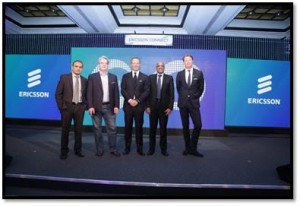As the mobile and video subscribers base in India is growing phenomenally, network infrastructure has to undergo  transformation for the connected soceity. Sweden-based Ericsson has identified mobility, broadband and cloud as the three key engines for its growth.
transformation for the connected soceity. Sweden-based Ericsson has identified mobility, broadband and cloud as the three key engines for its growth.
With the growing mobile and video subscribers, the company is gearing up its network infrastructure to manage the 7.7 billion mobile broadband subscriptions predicted by 2020, when 70 percent of the world’s population will have a smartphone.
The company has been working hard to resolve the call drop issue and launched Ericsson Radio System in India – a new approach to radio networks on the road to 5G – and Ericsson HDS 8000, a hyperscale upgrade to Ericsson Cloud System that adds new software and hardware to ensure a secure cloud experience.
At a keynote at Ericsson Connect, the company’s flagship technology event in India, Ericsson President and CEO Hans Vestberg underlined Ericsson’s focus on innovation and commitment to drive and capture the transformation that the development and implementation of ICT brings in.
Vestberg said: “ICT is transforming our society and has a fundamental effect on all sectors. At Ericsson, we have always been committed to innovation. Now we are leveraging the transformational power of mobility, broadband and the cloud, to realize the Networked Society”.
“No matter what business or service an organization delivers today, digitization can bring about a significant positive change. The ICT sector is well on its way to capturing the opportunities this brings to people, business and society. Building on its unique position in mobility, Ericsson continues to focus its R&D on developing leadership positions also beyond mobile networks to include the areas of IP networks, cloud, OSS/BSS, TV & Media, and Industry & Society.”
Vestberg continued: “Strengthening our position as a leading software company, as well as establishing early leadership in the standardization and realization of the next generation of mobile networks, or 5G, are key factors for success.”
FOCUS ON 5G
Earlier in 2015, Ericsson carried out a world-first demonstration of pre-standard 5G radio technology, delivering speeds of 5Gbps using 15GHz spectrum. With the high pace of innovation in the device and application industry, users expect ubiquitous coverage and demand the capability to use applications anywhere and anytime. This puts more requirements than ever on the network, since more standards, frequency bands and different layers of coverage and capacity solutions are needed. A multi-standard, multi-band and multi-layer approach is therefore a key component in enabling growth.
The company announced the introduction of its new Ericsson Radio System to the Indian market. The Radio System is a completely new approach to building radio networks on the road to 5G, with multi-standard, multi-band and multi-layer technology. It delivers the industry’s most energy-efficient and compact radio solution, while maintaining performance leadership at half the size and weight of previous solutions.
Paolo Colella, Head of Region India, Ericsson, says: “In the Networked Society, it becomes imperative to address the connectivity requirements of consumers, and also to tackle the challenges of security, governance and automation faced by businesses.”
“Ericsson is enabling service providers to address these opportunities with our innovative portfolio, including Ericsson Radio System and Ericsson HDS 8000. With the new Radio System, operators will be able to address increased demand for mobile broadband and ensure continued subscriber satisfaction. The Ericsson HDS 8000 is built with advanced automation capabilities that take datacenters and central offices to a new level of cloud economics, security and efficiency,” he said.
“Ericsson’s vision of the Networked Society is based on the idea that real-time connectivity will fundamentally change the way we innovate, collaborate, produce, govern and live sustainably. By providing new communication tools and access to global knowledge, the Networked Society will empower every person and every industry to reach their full potential,” he added.









